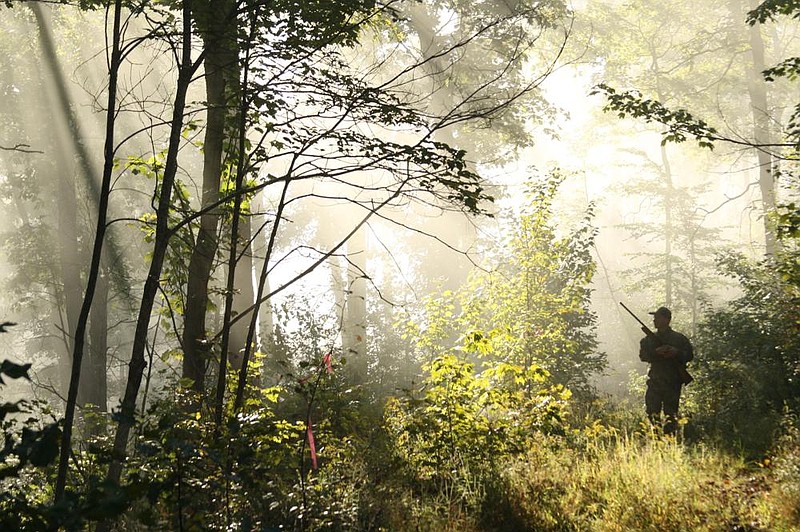Fall is coming, and for nearly half a million Arkansans, that means hunting season.
Joining the Natural State's hunting community is easy. All you need is a hunting license, a firearm or bow, and a place to go.
If you were were born after Jan. 1, 1969, you must pass a state-approved hunter education course. The course covers hunter safety, ethics, safe handling of firearms and archery equipment, and many other topics. You can take a traditional hunter education class in person or online. You can register for an online hunter education course at hunter-ed.com/arkansas.
Though my age exempts me from hunter education certification, I took the class anyway -- twice -- in two states because it is worthwhile.
Arkansas residents have a choice of two hunting licenses. The Resident Wildlife Conservation License costs $10.50 and entitles you to hunt squirrels, rabbits, quail, furbearers, and migratory birds such as doves, snipe and woodcocks. This license also entitles you to kill one deer. If you enjoy it, you can experience even more options with the Resident Sportsman's License. It costs $25 and entitles you to kill as many as six deer, as many as two wild turkeys, one black bear, one elk and one alligator. It also entitles you to hunt small game and migratory birds.
To hunt elk and alligators, you must apply for and be awarded a special permit through a computerized lottery.
If you hunt ducks and geese, you must also buy a resident duck stamp ($7) and a federal duck stamp ($25). You must also register for the Harvest Information Program, which is free. If you hunt on state-owned wildlife management areas, you will also need a free WMA general-use permit.
These are a lot of hoops, but hunters accept them as lifestyle requirements.
If you expect to hunt every year, you can bypass all of these annual fees by purchasing a Non-Expiring Resident Hunting and Fishing Sportsman's Permit. This $1,000 lifetime license covers everything, including additional fees to hunt on properties that the Arkansas Game and Fish Commission leases from private landowners, including Big Timber WMA, Casey Jones WMA, Cherokee WMA and Jack Mountain WMA. It also covers your application fees for controlled deer and turkey hunts on wildlife management areas. Though expensive, this license pays for itself over time and insulates you from hunting license fee increases.
With a vast array of state-owned wildlife management areas, federally-owned national forests, Corps of Engineers land and federal national wildlife refuges, Arkansas is great for public land hunting. All of these areas are open to small game hunting without additional fees or encumbrances, and you'll almost always have an area to yourself.
Squirrel season began on May 15 and runs through Feb. 28, 2021. It's one of the nation's longest continuous hunting seasons, and you can enjoy excellent hunting right now in the Winona District of the Ouachita National Forest between Paron and Perryville, and also in the Ozark National Forest north of Russellville and Clarksville.
Though world famous for duck hunting, Bayou Meto WMA and Dave Donaldson Black River WMA have excellent squirrel hunting, as does Madison County WMA near Huntsville, Galla Creek WMA near Russellville and White Rock Mountain WMA south of Fayetteville.
As you stalk the woods searching for squirrels, you will doubtless encounter whitetailed deer. If you want to hunt them, Arkansas has multiple deer seasons in which you may hunt with muzzleloading firearms and modern firearms. Archery deer season opens Sept. 25 and runs through Feb. 28.
Contrary to most hunting literature, you don't need fancy clothes with the latest camouflage patterns. Any pattern that breaks up your outline is sufficient. Military surplus garments are fine except for those with desert camo patterns, which are too light for woodland environments. Dark pants and a long-sleeve black T-shirt work fine, too.
Boots provide ankle support and protection from mud and water, but having been bitten by a rattlesnake, I strongly recommend snake boots, especially when hunting through early and mid-fall. Bad encounters with pit vipers are rare, but snake boots will greatly reduce the severity of an encounter. It is illegal to kill snakes in Arkansas unless a snake threatens your safety. Even if a snake takes a swipe at you, do not retaliate. Snakes are part of the ecosystem and fill an important niche in the fields and forests.
Finally, you'll need a weapon. A beginning hunter can get into the game with a modest ante. You can buy a single-shot, break-action shotgun for about $200, and a lot less in pawnshops. Rossi and others make convertible versions that come with a rifle barrel for deer and shotgun barrel for other game.
If you prefer a repeating shotgun, there is a vast selection of models available for about $500 or less, including the venerable Remington 870 pump-action. A 12-gauge model will enable you to hunt anything in Arkansas, including deer. You can use buckshot in a shotgun, or you can buy a special slug barrel that gives you the performance of a rifle.
For squirrels, you might prefer a .22-caliber rimfire rifle. Bolt-action and semi-automatic models are available from many manufacturers, including Marlin, Henry, Browning and Remington. A lot of old Winchesters are floating around, as well, and they are usually inexpensive.
Ultimately, you might want to try archery hunting. That is a subject for the Masters Hunting Series, which will follow the Beginner series.
Although hunting is generally considered a solitary pursuit, it is most fun in the company of friends. Buddies sometimes hunt together. Others split up and hunt separately, then share their hunts back at camp or back at the vehicle. Friendship and fellowship are the sweetest parts of a hunt, and hunting friendships are some of the strongest.
More News
First installment in the Beginner Hunting Series.

